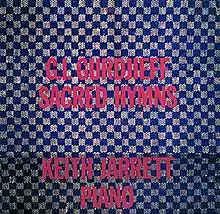G.I. Gurdjieff: Sacred Hymns
G.I. Gurdjieff: Sacred Hymns is an album of music written by George Gurdjieff and Thomas de Hartmann, performed by pianist Keith Jarrett which was released on the ECM label in 1980.[1]
| G.I. Gurdjieff: Sacred Hymns | ||||
|---|---|---|---|---|
 | ||||
| Studio album by | ||||
| Released | September 1980[1] | |||
| Recorded | March 1980[2] | |||
| Studio | Tonstudio Bauer, Ludwigsburg (West Germany) | |||
| Genre | Classical music | |||
| Length | 50:56 | |||
| Label | ECM Records [ECM 1174] | |||
| Producer | Manfred Eicher | |||
| Keith Jarrett chronology | ||||
| ||||
| Keith Jarrett solo piano chronology | ||||
| ||||
Background
Jarrett's interest in Gurdjieff dated back to the 1960s and his association with Charles Lloyd, who was "on a Gurdjieff kick" at the time, and whose copies of Gurdjieff's books Jarrett read.[3] Jarrett eventually immersed himself in Gurdjieff's writings and music, the latter having been transcribed by Russian composer Thomas de Hartmann.[4] At some point, a member of the London Gurdjieff Foundation suggested that Jarrett record some of Gurdjieff's music,[5] and Jarrett accepted. The resulting recording marked the first occasion on which Gurdjieff's music, as notated by de Hartmann, was made available to the public,[6] and was a major catalyst in bringing the music to the attention of a mainstream audience.[7]
Jarrett later reflected: "It was the most appropriate thing for me to record at the time, given that I knew more about it than just the music, and also given that I was asked by [a member of] the London group whether I would do it or not. That was enough for me. But it was also an exercise in disappearing personality. In the so-called Gurdjieff world, personality is not a positive thing... So I used that recording as an exercise in not inflicting that music with my personality."[8] (Not surprisingly, Jarrett abstained almost completely from the use of improvisation on the album.[4]) Jarrett stopped reading Gurdjieff's writings in the early 1980s, but stated: "the impression shouldn't be that I have at some point or other refuted it."[9]
Reception
The Allmusic review by Richard S. Ginell awarded the album 3 stars, noting, "The whole record has a serene dignity, even at its loudest levels, that gets to you, and that should be enough for the devout Jarrett following. As for others -- well, it's definitely not a Top Ten choice for a basic Jarrett collection".[10]
| Review scores | |
|---|---|
| Source | Rating |
| Allmusic | |
| The Penguin Guide to Jazz | |
Track listing
- All compositions by George Ivanovich Gurdjieff and Thomas de Hartmann
- "Reading of Sacred Books" - 8:19
- "Prayer and Despair" - 3:50
- "Religious Ceremony" - 4:07
- "Hymn" - 2:45
- "Orthodox Hymn from Asia Minor" - 3:04
- "Hymn for Good Friday" - 1:35
- "Hymn" - 2:30
- "Hymn for Easter Thursday" - 3:26
- "Hymn to the Endless Creator" - 2:04
- "Hymn from a Great Temple" - 4:30
- "The Story of the Resurrection Of Christ" - 1:37
- "Holy Affirming - Holy Denying - Holy Reconciling" - 4:14
- "Easter Night Procession" - 2:54
- "Easter Hymn" - 5:49
- "Meditation" - 1:42
Personnel
- Keith Jarrett – piano
Production
- Manfred Eicher - producer
- Kathelin Hoffman - research and co-ordination
- Martin Wieland - recording engineer
- Barbara Wojirsch - cover design and layout
References
- ECM Records Keith Jarrett: G.I. Gurdjieff: Sacred Hymns accessed May 2020
- Keith Jarrett discography accessed May 2020
- Carr, Ian (1992). Keith Jarrett: The Man and his Music. Da Capo. p. 41.
- Sandner, Wolfgang (2020). Keith Jarrett: A Biography. Translated by Jarrett, Chris. Equinox. p. 102.
- Petsche, Johanna J.M. (2015). Gurdjieff and Music: The Gurdjieff/de Hartmann Piano Music and Its Esoteric Significance. Brill. p. 148.
- Petsche, Johanna J.M. (2015). Gurdjieff and Music: The Gurdjieff/de Hartmann Piano Music and Its Esoteric Significance. Brill. p. 147.
- Petsche, Johanna J.M. (2015). Gurdjieff and Music: The Gurdjieff/de Hartmann Piano Music and Its Esoteric Significance. Brill. p. 10.
- Carr, Ian (1992). Keith Jarrett: The Man and his Music. Da Capo. pp. 128–129.
- Carr, Ian (1992). Keith Jarrett: The Man and his Music. Da Capo. p. 130.
- Ginell, R. S. Allmusic Review accessed August 15, 2011
- Cook, Richard; Morton, Brian (2008). The Penguin Guide to Jazz Recordings (9th ed.). Penguin. p. 769. ISBN 978-0-141-03401-0.